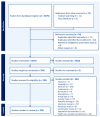Key Determinants Influencing Treatment Decision-Making for and Adherence to Active Surveillance for Prostate Cancer: A Systematic Review
- PMID: 40710432
- PMCID: PMC12299976
- DOI: 10.3390/jpm15070315
Key Determinants Influencing Treatment Decision-Making for and Adherence to Active Surveillance for Prostate Cancer: A Systematic Review
Abstract
Background/Objectives: Men choosing active surveillance (AS) for low- and intermediate risk prostate cancer (PCa) must weigh its harms and benefits against those of active treatment (AT). To understand factors influencing treatment decision-making (TDM) for and adherence to AS, we performed a systematic review. Methods: This systematic review followed the PRISMA guidelines and was registered with PROSPERO (ID CRD42024490427). A comprehensive search strategy from 1990 to 2024 was executed across multiple databases, including Medline and Embase. Studies were included if they examined factors influencing TDM for AS or active monitoring (AM) and adherence to AS/AM. Results: Of the 8316 articles identified, 223 articles were eligible for inclusion. The decision for AS was influenced by different factors, including comprehensive information about treatment options, social support, and wanting to avoid side-effects. Key reasons to choose AT over AS included a lack of information from healthcare professionals about AS and fear of disease progression. Reasons for adhering to the AS protocol included better quality of life and social support. While non-adherence to the AS protocol is prompted by, e.g., biopsy burden and uncertainty, AS discontinuation is generally a results of medical reasons (namely disease upgrading) or from anxiety and family pressure. Conclusions: Numerous factors influence men's treatment pathway choices. Involving family members in shared decision-making and ensuring that patients have detailed information about AS as a treatment option could help to improve AS uptake. Addressing psychosocial challenges through education and family involvement could improve AS adherence. These insights can help healthcare providers by addressing men's needs during TDM and AS.
Keywords: active surveillance; discontinuation; prostate cancer; treatment choice adherence; treatment decision.
Conflict of interest statement
The authors declare no conflicts of interest.
Figures
Similar articles
-
The experience of adults who choose watchful waiting or active surveillance as an approach to medical treatment: a qualitative systematic review.JBI Database System Rev Implement Rep. 2016 Feb;14(2):174-255. doi: 10.11124/jbisrir-2016-2270. JBI Database System Rev Implement Rep. 2016. PMID: 27536798
-
Sexual Harassment and Prevention Training.2024 Mar 29. In: StatPearls [Internet]. Treasure Island (FL): StatPearls Publishing; 2025 Jan–. 2024 Mar 29. In: StatPearls [Internet]. Treasure Island (FL): StatPearls Publishing; 2025 Jan–. PMID: 36508513 Free Books & Documents.
-
Decision aids for people facing health treatment or screening decisions.Cochrane Database Syst Rev. 2014 Jan 28;(1):CD001431. doi: 10.1002/14651858.CD001431.pub4. Cochrane Database Syst Rev. 2014. Update in: Cochrane Database Syst Rev. 2017 Apr 12;4:CD001431. doi: 10.1002/14651858.CD001431.pub5. PMID: 24470076 Updated.
-
Decision aids for people facing health treatment or screening decisions.Cochrane Database Syst Rev. 2011 Oct 5;(10):CD001431. doi: 10.1002/14651858.CD001431.pub3. Cochrane Database Syst Rev. 2011. Update in: Cochrane Database Syst Rev. 2014 Jan 28;(1):CD001431. doi: 10.1002/14651858.CD001431.pub4. PMID: 21975733 Updated.
-
Community views on mass drug administration for soil-transmitted helminths: a qualitative evidence synthesis.Cochrane Database Syst Rev. 2025 Jun 20;6(6):CD015794. doi: 10.1002/14651858.CD015794.pub2. Cochrane Database Syst Rev. 2025. PMID: 40539472 Review.
References
-
- Taylor K.L., Luta G., Hoffman R.M., Davis K.M., Lobo T., Zhou Y., Leimpeter A., Shan J., E Jensen R., Aaronson D.S., et al. Quality of life among men with low-risk prostate cancer during the first year following diagnosis: The PREPARE prospective cohort study. Transl. Behav. Med. 2018;8:156–165. doi: 10.1093/tbm/ibx005. - DOI - PMC - PubMed
-
- Aizer A.A., Gu X., Chen M.-H., Choueiri T.K., Martin N.E., Efstathiou J.A., Hyatt A.S., Graham P.L., Trinh Q.-D., Hu J.C., et al. Cost Implications and Complications of Overtreatment of Low-Risk Prostate Cancer in the United States. J. Natl. Compr. Cancer Netw. 2015;13:61–68. doi: 10.6004/jnccn.2015.0009. - DOI - PubMed
Publication types
Grants and funding
LinkOut - more resources
Full Text Sources
Research Materials



